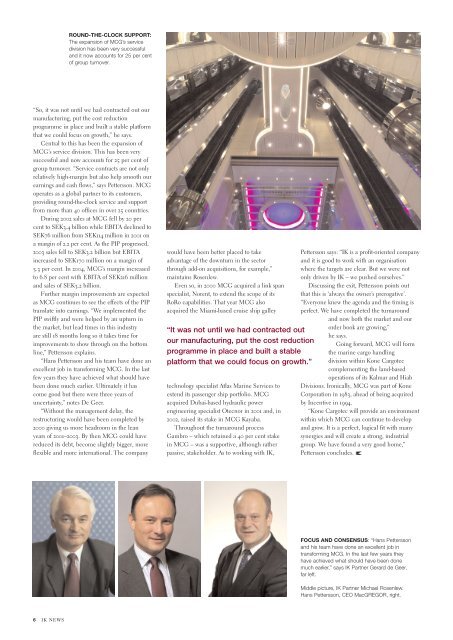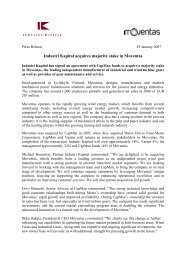Rooms for improvement - IK Investment Partners
Rooms for improvement - IK Investment Partners
Rooms for improvement - IK Investment Partners
You also want an ePaper? Increase the reach of your titles
YUMPU automatically turns print PDFs into web optimized ePapers that Google loves.
ROUND-THE-CLOCK SUPPORT:<br />
The expansion of MCG’s service<br />
division has been very successful<br />
and it now accounts <strong>for</strong> 25 per cent<br />
of group turnover.<br />
“So, it was not until we had contracted out our<br />
manufacturing, put the cost reduction<br />
programme in place and built a stable plat<strong>for</strong>m<br />
that we could focus on growth,” he says.<br />
Central to this has been the expansion of<br />
MCG’s service division. This has been very<br />
successful and now accounts <strong>for</strong> 25 per cent of<br />
group turnover. “Service contracts are not only<br />
relatively high-margin but also help smooth our<br />
earnings and cash flows,” says Pettersson. MCG<br />
operates as a global partner to its customers,<br />
providing round-the-clock service and support<br />
from more than 40 offices in over 25 countries.<br />
During 2002 sales at MCG fell by 20 per<br />
cent to SEK3.4 billion while EBITA declined to<br />
SEK76 million from SEK114 million in 2001 on<br />
a margin of 2.2 per cent. As the PIP progressed,<br />
2003 sales fell to SEK3.2 billion but EBITA<br />
increased to SEK170 million on a margin of<br />
5.3 per cent. In 2004, MCG’s margin increased<br />
to 6.8 per cent with EBITA of SEK216 million<br />
and sales of SEK3.2 billion.<br />
Further margin <strong>improvement</strong>s are expected<br />
as MCG continues to see the effects of the PIP<br />
translate into earnings. “We implemented the<br />
PIP swiftly and were helped by an upturn in<br />
the market, but lead times in this industry<br />
are still 18 months long so it takes time <strong>for</strong><br />
<strong>improvement</strong>s to show through on the bottom<br />
line,” Pettersson explains.<br />
“Hans Pettersson and his team have done an<br />
excellent job in trans<strong>for</strong>ming MCG. In the last<br />
few years they have achieved what should have<br />
been done much earlier. Ultimately it has<br />
come good but there were three years of<br />
uncertainty,” notes De Geer.<br />
“Without the management delay, the<br />
restructuring would have been completed by<br />
2000 giving us more headroom in the lean<br />
years of 2001–2003. By then MCG could have<br />
reduced its debt, become slightly bigger, more<br />
flexible and more international. The company<br />
would have been better placed to take<br />
advantage of the downturn in the sector<br />
through add-on acquisitions, <strong>for</strong> example,”<br />
maintains Rosenlew.<br />
Even so, in 2000 MCG acquired a link span<br />
specialist, Norent, to extend the scope of its<br />
RoRo capabilities. That year MCG also<br />
acquired the Miami-based cruise ship galley<br />
“It was not until we had contracted out<br />
our manufacturing, put the cost reduction<br />
programme in place and built a stable<br />
plat<strong>for</strong>m that we could focus on growth.”<br />
technology specialist Atlas Marine Services to<br />
extend its passenger ship portfolio. MCG<br />
acquired Dubai-based hydraulic power<br />
engineering specialist Otecnor in 2001 and, in<br />
2002, raised its stake in MCG Kayaba.<br />
Throughout the turnaround process<br />
Gambro – which retained a 40 per cent stake<br />
in MCG – was a supportive, although rather<br />
passive, stakeholder. As to working with <strong>IK</strong>,<br />
Pettersson says: “<strong>IK</strong> is a profit-oriented company<br />
and it is good to work with an organisation<br />
where the targets are clear. But we were not<br />
only driven by <strong>IK</strong> – we pushed ourselves.”<br />
Discussing the exit, Pettersson points out<br />
that this is ‘always the owner’s prerogative’.<br />
“Everyone knew the agenda and the timing is<br />
perfect. We have completed the turnaround<br />
and now both the market and our<br />
order book are growing,”<br />
he says.<br />
Going <strong>for</strong>ward, MCG will <strong>for</strong>m<br />
the marine cargo handling<br />
division within Kone Cargotec<br />
complementing the land-based<br />
operations of its Kalmar and Hiab<br />
Divisions. Ironically, MCG was part of Kone<br />
Corporation in 1983, ahead of being acquired<br />
by Incentive in 1994.<br />
“Kone Cargotec will provide an environment<br />
within which MCG can continue to develop<br />
and grow. It is a perfect, logical fit with many<br />
synergies and will create a strong, industrial<br />
group. We have found a very good home,”<br />
Pettersson concludes.<br />
FOCUS AND CONSENSUS: “Hans Pettersson<br />
and his team have done an excellent job in<br />
trans<strong>for</strong>ming MCG. In the last few years they<br />
have achieved what should have been done<br />
much earlier,” says <strong>IK</strong> Partner Gerard de Geer,<br />
far left.<br />
Middle picture, <strong>IK</strong> Partner Michael Rosenlew.<br />
Hans Pettersson, CEO MacGREGOR, right.<br />
6 ik news
















